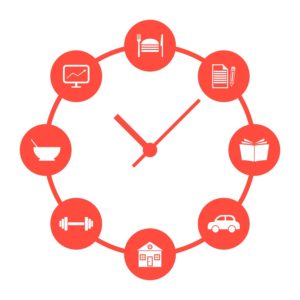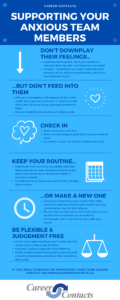 Anxiety is essentially our brain’s response to imminent danger; for someone with an anxiety disorder that signal functions less like a motion light and more like a lighthouse. But in a time like this where that signal is firing for so many people all around the planet, knowing how to support your team members and loved ones with already present anxiety issues is more important than ever.
Anxiety is essentially our brain’s response to imminent danger; for someone with an anxiety disorder that signal functions less like a motion light and more like a lighthouse. But in a time like this where that signal is firing for so many people all around the planet, knowing how to support your team members and loved ones with already present anxiety issues is more important than ever.
Here are a few key things to keep in mind when speaking to someone struggling with anxiety:
Don’t downplay their feelings…
Everyone is entitled to how they are feeling. Saying things like “don’t get worked up,” “everyone feels like this,” and “it really isn’t a big deal,” while coming from a place of helpfulness can have the opposite effect. In this global climate, suggesting that being fearful is overreacting can cause their anxiety to shift to worrying that you may not be taking the appropriate precautions which just adds more things to the list of worries on their mind. Also, it may be second nature to suggest that it is not a unique feeling and attempt to offer perspective with “at least…” statements but that can make it seem like their anxiety is not as valid as someone else’s, which can cause feelings of guilt.
…but don’t feed into them
Sometimes talking about their feelings is the only way for someone to process them but put effort into not letting the entire conversation be driven by anxiety. Offer your compassion and interest with statements like, “what could I do to help you right now” or “would you like me to offer advice or do you just need someone to listen.” Once the conversation is settling, change the subject to something more lighthearted by asking a simple question like, “I am running out of things to watch, have you watched any great shows lately that I should check out?”, something that will shift the thought process away from stress. It is important to try to end the call on a lighter topic so that they are not hanging up only to sit with their anxiety again, especially in a time where there is not much else going on to distract us.
Check In
 If this person is a team member and you have only been connecting during work hours about work-related things, remember that everyone in some way or another is struggling right now and probably feeling lonely. So, showing that you care about them as a person separate from work can be impactful. Touch base by simply sending a text just to check in, share a funny Instagram post that made you think of them, or even give them a casual call to chat and show you care.
If this person is a team member and you have only been connecting during work hours about work-related things, remember that everyone in some way or another is struggling right now and probably feeling lonely. So, showing that you care about them as a person separate from work can be impactful. Touch base by simply sending a text just to check in, share a funny Instagram post that made you think of them, or even give them a casual call to chat and show you care.
If you have a friend that you maybe haven’t connected with in a while use this time as an opportunity. How many times do we say, “I need to call this person” and then get busy with life or can never connect with them because of opposite schedules? This is the perfect time to reconnect and let someone know you are thinking about them and there for them during this challenging time.
If you are busy juggling kids, family, and work during this time and are not available for a phone check in often, still keep in touch and offer something to keep them busy like a show recommendation, a Spotify playlist you made for them, or a great eBook they could download. Small gestures and small distractions will be very helpful.
Keep your routine
Nearly everyone is functioning on a new routine right now, try to maintain elements of your old routine as much as possible. If you have a team that always eats lunch together on Monday, do a Zoom lunch. If you always go to brunch with your friend on Saturday, turn on FaceTime and chat with each other while you make brunch from home. Keeping as much normalcy as possible while also doing your part to keep yourself and everyone else safe will be beneficial for the mental health of everyone involved.
Make a new routine
If you have something in your routine that really cannot be replicated virtually, like a weekly hockey game or bar trivia, get creative and stay connected during that time anyway. The less time we have idle to feel alone, the less time we will have to ruminate on our anxieties. Have an online board game night with those old Yahoo! Games everyone used to play before iPhones, watch a YouTube drawing tutorial and find out who is the better artist, just do something new and fun together until you can actually be together again.
Be flexible

You may try to maintain your routines, say all the right things, and it might not feel like it is helping. You may suggest virtual activities in lieu of the physical ones and you may get turned down. Be patient and be flexible. This is a new journey for everyone, and everyone is going to approach it differently. Don’t get angry or stop reaching out to your friends who pull away. Continue to check in and be okay with no response, just continue to make it clear that you care and are here for them. If one of your team members would rather skip the virtual lunch to take a nap, let them. This whole process is exhausting for everyone, especially those with anxiety disorders.
Don’t judge
Everyone is going to approach this differently. If they are being responsible, social distancing, and protecting themselves and others, everything else is their own prerogative. Just be understanding and judgement free.

The most important thing is to remember that everyone is struggling right now, and to pay extra care to the people we know were struggling before. The most valuable thing that any of us can do right now, aside from staying home, is to continue to foster our connections and stay united even in our physical isolation.
If you have any questions about team building and employee support, please reach out to
natasha@careercontacts.ca!

